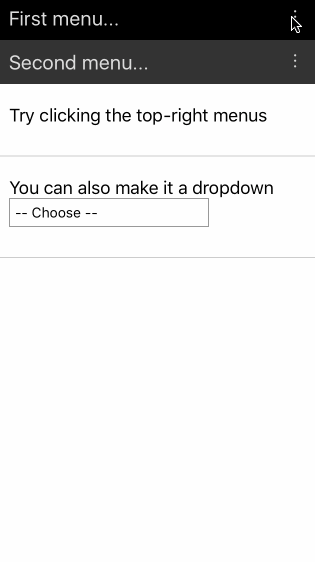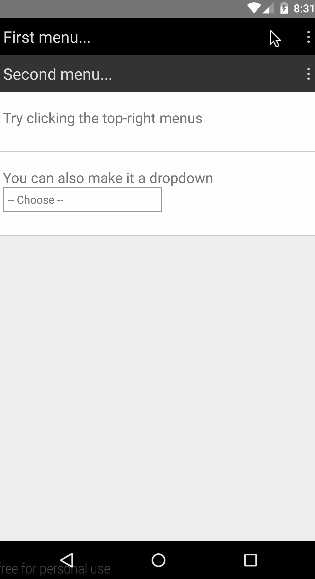A menu component for Android and iOS that provides a dropdown similar to Android's Spinner, but does not retain a persistent selection.
The API is very flexible so you are free to extend the styling and behaviour.
$ npm install react-native-menu --save
| iOS | Android |
|---|---|
 |
 |
import React, { View, Text, AppRegistry } from 'react-native';
import Menu, { MenuContext, MenuOptions, MenuOption, MenuTrigger } from 'react-native-menu';
const App = () => (
// You need to place a MenuContext somewhere in your application, usually at the root.
// Menus will open within the context, and only one menu can open at a time per context.
<MenuContext style={{ flex: 1 }}>
<TopNavigation/>
<View style={{ flex: 1, justifyContent: 'center', alignItems: 'center' }}><Text>Hello!</Text></View>
</MenuContext>
);
const TopNavigation = () => (
<View style={{ padding: 10, flexDirection: 'row', backgroundColor: 'pink' }}>
<View style={{ flex: 1 }}><Text>My App</Text></View>
<Menu onSelect={(value) => alert(`User selected the number ${value}`)}>
<MenuTrigger>
<Text style={{ fontSize: 20 }}>⋮</Text>
</MenuTrigger>
<MenuOptions>
<MenuOption value={1}>
<Text>One</Text>
</MenuOption>
<MenuOption value={2}>
<Text>Two</Text>
</MenuOption>
</MenuOptions>
</Menu>
</View>
);
AppRegistry.registerComponent('Example', () => App);Important: In order for the <Menu/> to work, you need to mount <MenuContext/> as an ancestor to <Menu/>. This allows
the menu to open on top of all other components mounted under <MenuContext/> -- basically, the menu will be moved
to be the last child of the context.
You must also have a <MenuTrigger/> and a <MenuOptions/> as direct children under <Menu/>. The MenuTrigger component
opens the menu when pressed. The MenuOptions component can take any children, but you need at least one MenuOption
child in order for the menu to actually do anything.
The MenuOption component can take any children.
Please refer to the full working example here.
Methods:
- isMenuOpen() -- Returns
trueif menu is open - openMenu() -- Opens the menu
- closeMenu() -- Closes the menu
- toggleMenu() -- Toggle the menu between open and close
Props:
None
Methods:
- getName() -- Returns the menu name (e.g. useful to get auto generated name)
Props:
onSelect-- This function is called with the value theMenuOptionthat has been selected by the user
Props:
disabled-- If true, then this trigger is not pressablestyle-- Overrides default style properties (user-defined style will take priority)
Props:
optionsContainerStyle-- Provides custom styling for options containerrenderOptionsContainer-- A function that renders takes in theMenuOptionselement and renders a container element that contains the options. Default function wraps options with aScrollView.
For example, if you want to change the options width to 300, you can use <MenuOptions optionsContainerStyle={{ width: 300 }}>.
To further customize the rendered content you can do something like
<MenuOptions renderOptionsContainer={(options) => <SomeCustomContainer>{options}</SomeCustomContainer>}>.
Props:
disabled-- If true, then this option is not selectablestyle-- Overrides default style properties (user-defined style will take priority)
- Fixes a performance issue where registering menu options on already rendered and opened menu causes infinite render loop (Closes #5, #9).
- Fixes issue where multiple unnamed
Menucomponents under one `MenuContext causes bad positioning.
- Lazily calculate menu position on open -- fixes stale calculation issues.
- Allow positioning of menu to be customized (currently only anchors to top-right of
Menu). - Detect if the menu will be rendered off-screen, and adjust positioning accordingly.
Install dev modules:
npm install
npm run test:unit
Make sure you have a connected android device. You find list devices using adb devices.
npm run test:integration
Contributions are welcome! Just open an issues with any ideas or pull-requests. I will take a look when I have time. :)
